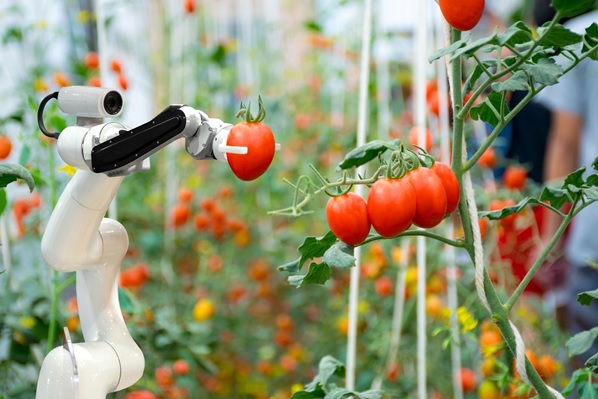
Home » Transforming Agriculture with Artificial Intelligence: Cultivating of Smart Future

The world is on the cusp of a technological revolution, and the agricultural sector is no exception. Artificial Intelligence (AI) is emerging as a powerful tool that holds immense potential to revolutionize agriculture. By harnessing the capabilities of AI, farmers can enhance productivity, optimize resource utilization, and make data-driven decisions. In this blog post, we delve into the various applications of AI in agriculture and explore how it is reshaping the industry.
Precision Farming:
AI plays a vital role in precision farming, enabling farmers to monitor and manage their fields with unprecedented accuracy. By integrating data from various sources such as sensors, drones, satellites, and weather stations, AI algorithms can analyze vast amounts of information to provide actionable insights. These insights help farmers make informed decisions regarding irrigation, fertilization, pest control, and crop health, leading to increased yields and resource efficiency.
Crop Monitoring and Disease Detection:
AI-powered systems can monitor crops continuously and detect early signs of diseases, pests, or nutrient deficiencies. Machine learning algorithms can analyse images captured by drones or sensors to identify patterns and anomalies in plant health. By promptly detecting and diagnosing issues, farmers can take appropriate measures to mitigate risks and minimize crop losses. AI also enables the development of predictive models that anticipate disease outbreaks based on historical and real-time data, enabling proactive disease management.
Agricultural Robotics:
AI-driven robotics is transforming the way agricultural tasks are performed. Robots equipped with AI algorithms can autonomously perform activities such as planting, weeding, harvesting, and sorting. These robots can navigate fields, identify crops, and execute tasks with precision, reducing labor costs and increasing efficiency. AI algorithms can also learn and adapt to optimize their performance over time, improving productivity and minimizing errors.
Data-driven Decision Making:
AI excels at processing vast amounts of data and extracting meaningful insights. By leveraging AI techniques like machine learning and data analytics, farmers can make data-driven decisions regarding planting schedules, crop selection, and resource allocation. AI algorithms can analyse historical data, weather patterns, market trends, and other factors to provide recommendations and optimize farm management strategies. This empowers farmers to adapt to changing conditions and make informed choices that maximize profitability.
Supply Chain Optimization:
AI has the potential to revolutionize supply chain management in agriculture. By analysing data on demand, transportation routes, storage conditions, and market dynamics, AI algorithms can optimize logistics, reduce waste, and ensure timely delivery of agricultural products. Predictive analytics can help forecast demand, enabling farmers to plan their production and distribution accordingly, minimizing post-harvest losses and maximizing market opportunities.
Artificial Intelligence is rapidly transforming agriculture by introducing smart and data-driven practices. From precision farming to crop monitoring, AI-driven systems are empowering farmers to make informed decisions, optimize resource allocation, and increase productivity. As technology continues to advance, the integration of AI in agriculture holds the promise of sustainable and efficient food production. By embracing AI, farmers can cultivate a smart future, ensuring food security, environmental sustainability, and economic growth for generations to come.
From
Dr. Ravi Prakash Mishra
Asso. Prof./ Head
June 9, 2023RECENT POSTS
CATEGORIES
TAGS
Agriculture Agriculture future AI Architecture artificial intelligence Bachelor of Commerce BA English BA Psychology BTech AIML BTech CSE BTech Engineering Business management career Career-Specific Education career guide career option career scope Civil engineering commerce and management Computer Science Computer science engineering Data science degree education Engineering Engineering students English Literature english program Fashion Design Fashion design course Higher Education Journalism journalism and mass communication law Law career Machine Learning Master degree mathematics MBA MBA specialization Mechanical Engineering Pharmacy Psychology Research and Development students
University Address: Nachauli, Jasana Road, Faridabad, Haryana
For Admissions :
Toll Free: 1800-120-4613
Mobile : 8447744303 | 8447744304 | 8447744306 | 8447744309
8700003974 | 8700003411 | 8700003749
Address: C-72, Second Floor, Shivalik, Near Malviya Nagar,
Above HDFC Bank, New Delhi 110017
Landline No. - 011-46570515 / 45138169 / 41755703
Mobile No. - +91-7303152412 / +91-7303152420 / +91-9311321952
Jagmani Kutir, Ground Floor, Road No-1, Rajeev Nagar,
Near Darbar Marriage Hall, Patna-800024, Bihar
Contact No: 9818352069/ 8130120095
Mail: kanhaiya@lingayasvidyapeeth.edu.in
Copyrights © 1998 - 2025 Lingaya's Vidyapeeth (Deemed To Be University). All rights reserved.
It is important to note that the following email IDs and domains are fraudulent and do not belong to our university.
LV only conducts physical/online verification of any document related to examination on the following email id: